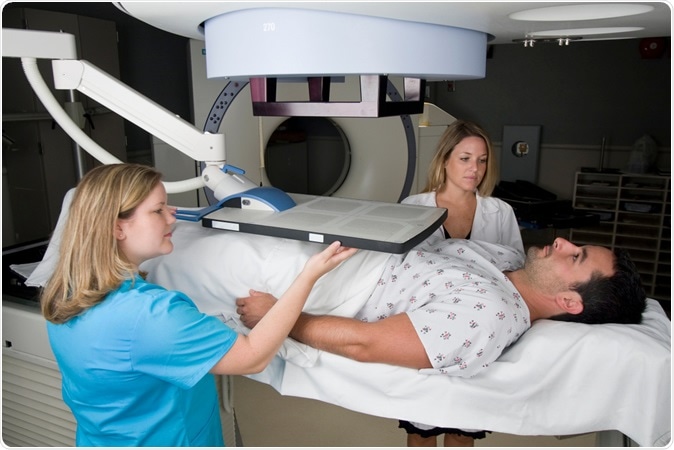A new major study from London has shown that radiotherapy can extend survival among patients with prostate cancer. The study shows that larger number of patients given standard hormone therapy along with radiation therapy survived three years after the initiation of the study despite having a local spread of their cancer.
Until now hormone therapy was the standard for prostate cancer. This study adds that when radiation therapy is added to it among people with locally advanced form of the cancer, the survival may be prolonged. Earlier it was believed that when the cancer has spread to the nearby lymph nodes and bones, the treatment targeting the prostate gland itself was futile and thus in these cases generalized hormone therapy was the norm.

Patient receiving radiation therapy for prostate cancer. Image Credit: Mark_Kostich / Shutterstock
The results from the new study appeared in the latest issue of The Lancet. The study titled, “Radiotherapy to the primary tumour for newly diagnosed, metastatic prostate cancer (STAMPEDE): a randomised controlled phase 3 trial,” was presented at the European Society for Medical Oncology conference in Munich.
Scientists at University College London and The Royal Marsden Hospital included 2,061 men with prostate cancer for this study. Half of these men were treated with standard hormonal therapy alone (1,029) while the other half received hormonal therapy along with radiation therapy (1,032). Each year there are 47,000 men in UK who are diagnosed with prostate cancer and of these 11,500 die. This treatment could save lives of at least 3,000 among these say the researchers.
The study showed that 73 per cent of those given the standard hormone therapy survived for three years after initiation of treatment. On the other hand 81 per cent of those who received hormone therapy and radiotherapy survived these three years post initiation of treatment. The benefit however could be seen only in men with locally-advanced prostate cancer and was not seen among men whose cancer had spread to distant organs or bones.
According to Dr Chris Parker, lead researcher of the study from The Royal Marsden hospital said that this study showed a “powerful effect for certain men with advanced prostate cancer.” He added, “These findings could and should change standard of care worldwide. Until now, it was thought that there was no point in treating the prostate itself if the cancer had already spread because it would be like shutting the stable door after the horse has bolted. However, this study proves the benefit of prostate radiotherapy for these men. Unlike many new drugs for cancer, radiotherapy is a simple, relatively cheap treatment that is readily available in most parts of the world.” Professor Charles Swanton, Cancer Research UK’s chief clinician called this a “monumental” finding”.
Authors conclude in their study, “Prostate radiotherapy should be a standard treatment option for men with newly diagnosed disease with a low metastatic burden.”
The study was funded by the Cancer Research UK, UK Medical Research Council, Swiss Group for Clinical Cancer Research, Astellas, Clovis Oncology, Janssen, Novartis, Pfizer, and Sanofi-Aventis.